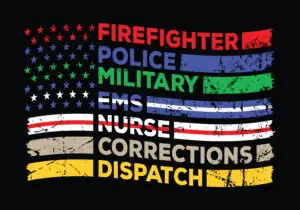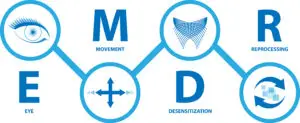The Effects of Moral Injury on Police Officers and the Role of EMDR in Recovery Policing is an inherently high-stress profession that exposes officers to a wide range of traumatic events, from violent encounters to witnessing human suffering. While the mental health challenges associated with law enforcement, such as post-traumatic stress disorder (PTSD), are widely …
The Effects of Moral Injury on Police Officers and the Role of EMDR in Recovery
Policing is an inherently high-stress profession that exposes officers to a wide range of traumatic events, from violent encounters to witnessing human suffering. While the mental health challenges associated with law enforcement, such as post-traumatic stress disorder (PTSD), are widely acknowledged, there is another significant but often overlooked psychological consequence: moral injury. Unlike PTSD, which is primarily rooted in fear-based trauma, moral injury arises when officers experience, witness, or participate in actions that deeply violate their moral and ethical beliefs. This can lead to profound guilt, shame, and emotional distress that disrupt an officer’s sense of self, purpose, and professional identity.
As moral injury continues to be recognized as a serious concern within law enforcement, researchers and clinicians have explored various therapeutic approaches to help officers recover. Among the most promising treatments is Eye Movement Desensitization and Reprocessing (EMDR), a structured therapy that has been widely used for trauma recovery. EMDR helps officers process distressing experiences, reframe negative beliefs, and alleviate the psychological burden of moral injury. This blog will explore the nature of moral injury among police officers, its impact on mental health and job performance, and how EMDR therapy offers an effective path to healing and recovery.
Moral injury is defined as the psychological distress that results from acting in ways that violate one’s personal morals or values, witnessing others commit acts that contradict those values, or failing to prevent harm when it was within one’s power to do so (Litz et al., 2009). In policing, officers often find themselves in morally ambiguous or ethically challenging situations where the right course of action is unclear or may go against their moral compass.
For example, an officer may be forced to use lethal force in a situation where they later question whether it was justified. Others may struggle with orders that require them to enforce laws that seem unfair, such as responding to situations involving vulnerable populations like the homeless or mentally ill. Additionally, witnessing corruption or misconduct within their department and feeling powerless to intervene can lead to a deep sense of betrayal and disillusionment. Unlike PTSD, which is often associated with hypervigilance, flashbacks, and fear-based responses, moral injury manifests as guilt, shame, anger, and a loss of meaning or purpose (Drescher et al., 2011).
Officers who experience moral injury may find themselves withdrawing from their colleagues, struggling with self-worth, or questioning the legitimacy of their profession. This can lead to serious consequences, including depression, substance abuse, and suicidal ideation (Papazoglou et al., 2020). Given that law enforcement culture often discourages emotional expression and seeking help, many officers suffer in silence, increasing their risk of burnout and career dissatisfaction.
The psychological impact of moral injury in police officers extends far beyond personal distress. Officers experiencing moral injury often report symptoms of depression, anxiety, and emotional numbness, which can severely affect their ability to function both on and off the job (Griffin et al., 2019). Many experience intrusive thoughts about past incidents, questioning whether they could have done things differently. This self-doubt and rumination can erode confidence and impair decision-making in high-stakes situations.
Moral injury can also lead to anger and resentment, particularly when officers feel unsupported by their department or betrayed by leadership. If an officer believes they were forced into an ethically compromising position by their superiors, they may develop a deep mistrust of their institution. This sense of institutional betrayal has been linked to increased rates of job dissatisfaction, emotional detachment, and cynicism toward both the public and their fellow officers (Miller, 2022).
On an occupational level, moral injury contributes to high turnover rates, absenteeism, and decreased job performance. Officers experiencing moral distress may become disengaged, hesitant to act decisively, or overly aggressive as a way of coping with their internal turmoil (Papazoglou et al., 2020). This not only affects their well-being but also undermines public trust in law enforcement. A police officer struggling with moral injury may have difficulty empathizing with civilians, leading to strained community relations and a breakdown in effective policing.
Given these far-reaching effects, it is critical that law enforcement agencies implement effective interventions to address moral injury and support officers in their recovery. One such intervention that has shown promise is Eye Movement Desensitization and Reprocessing (EMDR) therapy.
Eye Movement Desensitization and Reprocessing (EMDR) is a structured psychotherapy approach that was originally developed for PTSD but has since been adapted to treat a wide range of trauma-related conditions, including moral injury (Shapiro, 2018). Unlike traditional talk therapy, EMDR does not require officers to verbally relive their traumatic experiences in great detail. Instead, it helps them process distressing memories in a way that reduces their emotional intensity and allows for cognitive restructuring.
During an EMDR session, the therapist guides the officer to focus on a specific traumatic memory while engaging in bilateral stimulation, such as guided eye movements, tapping, or auditory tones. This process is believed to help the brain reprocess the traumatic event in a way that diminishes its emotional charge, allowing the officer to view the event with greater clarity and less distress (Shapiro, 2018). Over time, negative beliefs associated with moral injury, such as “I am a bad person” or “I should have done more”, are replaced with more balanced and compassionate perspectives, such as “I did the best I could in a difficult situation”.
One of the key benefits of EMDR for moral injury is its ability to address the root emotional wounds of guilt, shame, and self-blame. Traditional cognitive-behavioral therapies (CBT) often focus on challenging irrational beliefs through logic and reasoning, but for many officers struggling with moral injury, their distress is not rooted in cognitive distortions alone—it is deeply emotional and existential (Russell et al., 2021). EMDR allows officers to process these emotions at a neurological level, leading to lasting relief and emotional healing.
Recent studies have shown that EMDR is highly effective in treating moral injury among police officers and other first responders. In a study by Hurley (2020), officers who underwent EMDR therapy reported significant reductions in guilt, shame, and emotional distress, as well as improved job performance and interpersonal relationships. Many participants described feeling a renewed sense of purpose and a greater ability to cope with the moral complexities of their profession.
EMDR has also been found to be particularly effective in addressing moral injury-related nightmares and intrusive thoughts, which are common among officers struggling with unresolved trauma. By reprocessing distressing memories, officers can regain a sense of control over their emotions and develop healthier coping mechanisms for dealing with job-related stressors (Russell et al., 2021).
Another advantage of EMDR is that it can be tailored to the unique experiences of law enforcement personnel. Therapists trained in first responder mental health can adapt EMDR protocols to address specific moral dilemmas, ethical conflicts, and incidents of institutional betrayal that officers have faced (Hurley, 2020). This personalized approach ensures that officers receive the most relevant and effective treatment possible.
Moral injury is a profound and often debilitating consequence of police work, leading to psychological distress, emotional detachment, and decreased job performance. Left untreated, it can contribute to burnout, substance abuse, and even suicide. Given the unique ethical and moral challenges that law enforcement officers face, it is crucial that they receive targeted support to process their experiences and rebuild their sense of self-worth.
EMDR therapy offers a powerful and effective solution for addressing moral injury, providing officers with the tools to reprocess traumatic memories, release feelings of guilt and shame, and restore a sense of purpose. As law enforcement agencies continue to recognize the importance of mental health care, integrating EMDR into officer wellness programs can play a critical role in ensuring that officers receive the healing they deserve. By prioritizing mental health and addressing moral injury head-on, we can foster a healthier, more resilient police force—one that is better equipped to serve both their communities and themselves.
References
Drescher, K. D., Foy, D. W., Kelly, C., Leshner, A., Schutz, K., & Litz, B. (2011). An exploration of the viability and usefulness of the construct of moral injury in war veterans. Traumatology, 17(1), 8-13.
Griffin, B. J., Purcell, N., Burkman, K., Litz, B. T., Bryan, C. J., Schmitz, M., & Maguen, S. (2019). Moral injury: An integrative review. Journal of Traumatic Stress, 32(3), 350-362.
Hurley, E. (2020). EMDR and first responders: The role of reprocessing trauma in law enforcement mental health. Springer.
Shapiro, F. (2018). Eye movement desensitization and reprocessing (EMDR) therapy: Basic principles, protocols, and procedures. Guilford Press.







